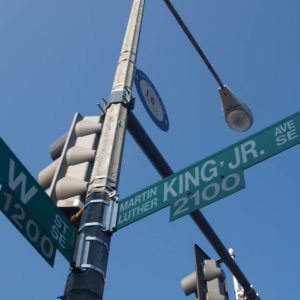Andy Shallal is nothing if not memorable. The Iraqi-born restaurateur behind Washington, D.C.’s beloved Busboys and Poets is six-foot-three, stylish, often dressed in a dark turtleneck like he’s headed to a poetry slam. An artistic soul, he was sporting something of a soul patch Thursday when he helped break ground on the seventh Busboys location in the District — a restaurant to be part of the nonprofit Far Southeast Family Strengthening Collaborative and Busboys’ first foray into business east of the Anacostia River in the city’s poorest, blackest neighborhoods.
In remarks at the Martin Luther King Jr. Avenue ceremony, Shallal lived up to memorability by talking about that river, and reciting “The Negro Speaks of Rivers” by Langston Hughes almost perfectly from memory. It was a fitting choice, somehow capturing the special place Anacostia has in the hearts of longtime Washingtonians as a bastion of black history and culture, notwithstanding persistent poverty and crime.
Yet even that — even a recitation of “my soul has grown deep like the rivers” in an otherwise routine speaking program — wasn’t the most memorable thing Shallal had to say. Toward the end of his comments, in which he thanked Democratic Mayor Muriel Bowser — on hand with city lawmakers — for investing millions in the collaborative, the restaurateur decided to address the elephant in the room.
He decided to acknowledge the fear, which has come justifiably with so much of the city’s breakneck development in the past decade, that new arrivals to communities won’t benefit their existing residents but drive up their living costs and, in some instances, force them out. This gentrification has strong racial overtones in the former “Chocolate City,” which ceased to be majority black in 2011, which has low-income residents who tend to be black, and which is swelling its population with relatively affluent newcomers who are often white.
“There’s a lot of suspicion about a business coming to Ward 8,” Shallal said, referring to the area encompassing Anacostia, which former Mayor Marion Barry represented on the D.C. Council until his death in 2014. “I assure you that my commitment goes way beyond just a business. It is really an effort to try to create space here in Ward 8 and prove to the rest of the city that Ward 8 is alive, vibrant, exciting, open for business.”
There are a multitude of obvious ways Busboys should benefit this ward, which has D.C.’s highest poverty and unemployment rates. The plan is to employ locals, both in construction and restaurant operation, and Shallal is know for providing good wages and benefits along with a sense of racial sensitivity on the job. (His mission statement promises “community where racial and cultural connections are consciously uplifted.”) Then there’s the fact that the city’s eastern wards are grossly neglected by retail, and many residents are excited about new dining. (Bowser raved about Busboys blackened salmon when she spoke at the groundbreaking.)
But D.C. has also seen the downside of development — a certain kind of development, at least. Speaking to InsideSources after the groundbreaking, which she celebrated, D.C. Council member Elissa Silverman pointed to neighborhoods like U Street and Columbia Heights as examples of where growth hasn’t worked for everyone. (Last year, Governing Magazine called Columbia Heights “the nation’s fastest-gentrifying neighborhood,” a popular landing spot for white millennial newcomers where “some of the strongest affordable housing protections haven’t been enough to keep lower-income residents from being priced out.”)
To guard against repeating this, Silverman is pushing for more government programs like housing tax credits and regulations cracking down on exploitative landlords. “We need to go on offense,” she said. “Largely we’ve been fighting gentrification defensively.”
Bowser is attempting to be more proactive, too, and her administration is piloting new programs with that in mind. One is “Our RFP,” wherein community engagement starts earlier the process of development. Residents are asked what kind of development they want for particular locations. Hundreds show up to public meetings, and the choice of a developer is made partially based on their input.
The mayor wants to make sure “development isn’t happening to the community but with the community,” Bowser said Thursday.
For all the real peril D.C. knows well, some of the concern may be overblown. “A growing body of research shows that gentrification in fact benefits poor residents,” the Atlantic reported last year. The publication quotes Lance Freeman, director of the urban planning program at Columbia University, as emphasizing how new community amenities can make life better for everyone, including longtime residents.
“Full service supermarkets that carry fresh produce, restaurants where residents could dine in, and well maintained parks are often lacking in poor neighborhoods prior to gentrification,” he said. “For long term residents who are able to stay, either due to housing subsidies, owning their home, or their own earning capacity improving, these changes are often appreciated.”
The Atlantic’s piece packed numerous studies in defense of gentrification and even cited its own Ta-Nehisi Coates, easily the most celebrated black writer of the moment, defending D.C.’s transformation specifically. The decline of the District’s black population, Coates noted, came “long before the arrival of hipsters, interlopers, and white people in general.”
“I say this to point out that the idea that incoming whites are ‘forcing out’ large number of blacks has yet to be demonstrated,” he wrote. “Speaking as though this is the case because it ‘feels true’ isn’t evidence.”
With evidence or not, though, fear remains alongside optimism in Anacostia and the city’s broader southeast.
Akili West, a Far Southeast Family Strengthening Collaborative board member who grew up in the area, told InsideSources people of all races are welcome to visit, do business and even buy homes. It’s just that the community wants to preserve one of the final strongholds of decidedly black business and home ownership.
In a changing nation’s capital, he said, “It’s really the last frontier.”

